The SSDNow V+ Series SSD (SNVP325-S2) from Kingston is their second generation prosumer, performance oriented SSD offered as a standalone drive and with an upgrade kit in capacities up to 512GB. This model supports read speeds up to 230MB/s and write speeds up to 180MB/s. With TRIM support and prices starting under $200 for a 64GB model, this SSD could be the perfect blend of price and performance.
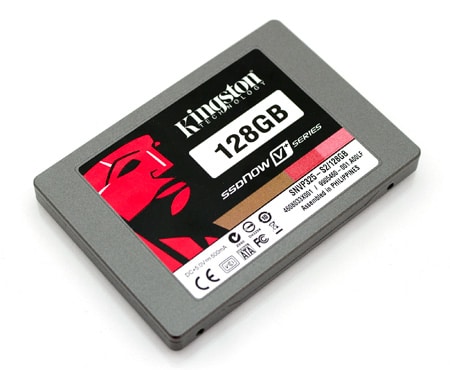
Technical Overview
Kingston SSDNow V+ Series 128GB SNVP325-S2/128GB Specifications:
- Sequential Read Throughput — 230MB/s
- Sequential Write Throughput — 180MB/s
- Form Factor — 2.5″
- Interface — SATA 1.5 Gb/sec. and 3.0 Gb/sec
- Capacity — 64 GB, 128 GB, 256 GB, 512 GB
- Storage temperatures — -40 – 85°C
- Operating temperatures — 0 – 70°C
- Dimensions — 69.85 x 100 x 9.5 mm
- Weight — 84 grams
- Vibration operating — 2.17G
- Vibration non-operating — 20G
- Power specs — 2.6 W – active / 0.15W Idle
- Life expectancy 2 — 1,000,000 Hrs mean time before failure
- Operating shock — 1500G
Aesthetics
Kingston designed a rugged and durable full-enclosed body for SSDNow V+ Series SSD. It is made up of two machined alloy pieces that are held tightly together with four 1.5mm allen screws located on the bottom. The top cover is adorned with a colorful Kingston logo placed in a recessed area of the cover. The logo includes drive information including model number, serial number, power requirements, and country of manufacture.
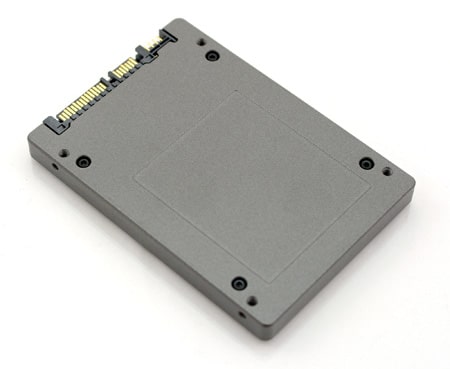

The connector side of the drive offers the standard SATA power and data connections as well as four jumper pins. The sides and bottom include screw holes for multiple mounting positions.
Disassembly
Separating the two halves of the Kingston V+ Series SSD is fairly painless given you own an allen wrench set. After taking apart multiple drives I have found that allen screws are easier to work with and have the lowest chance of rounding off the screw head compared to Phillips or Torx screws.
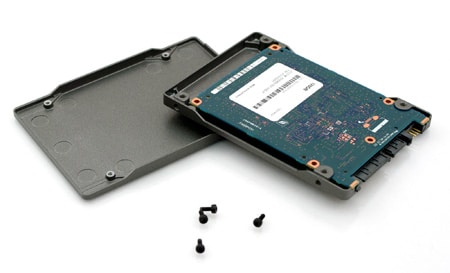
With the four screws removed the top cover easily lifts off and you are left with the circuit board attached to the lower cover. Initially we thought it was glued in place but carefully examining the area below the board revealed it was a large thermal pad holding the board in place. Using a plastic knife we were able to carefully break the seal between the two pieces and lift the circuit board out of the bottom tray.
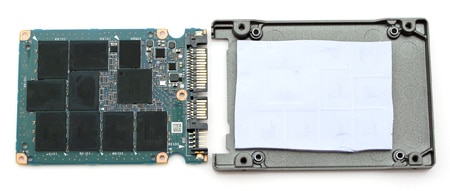
The Kingston SNVP325-S2 uses eight Toshiba MLC NAND flash chips, a Toshiba memory controller, and a single Micron memory chip. The controller is a Toshiba T6UG1XBG which supports native TRIM paired with a Micron 1Gb (128MB) 9LA17-D9HSJ DDR DRAM module. Flash storage includes eight 16GB Toshiba TH58NVG7D7EBAK0 NAND multi-layered chips.
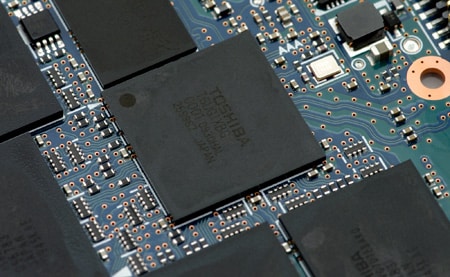
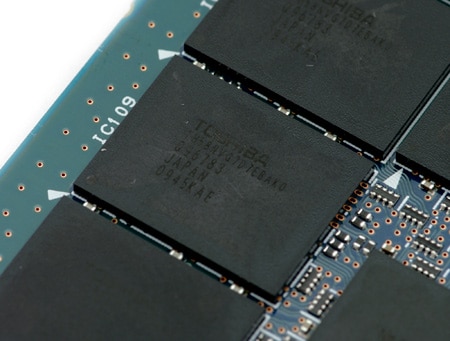
The layout is very clean taking up only a single side of the PCB and rugged as well. The design Kingston chose incorporating the thermal pad not only helps to limit thermal buildup within the SSD, but also acts as a mini shock absorber to limit stresses caused by heavy vibration.
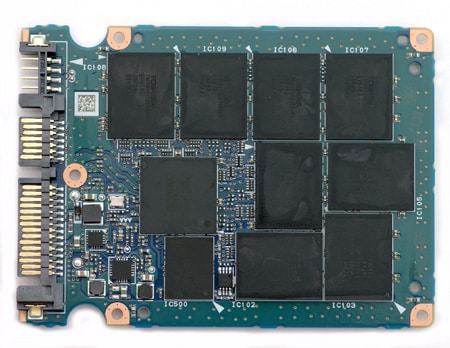
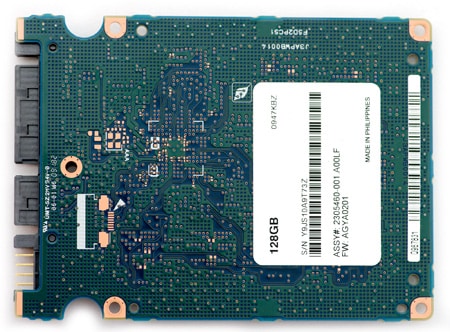
The 128GB SSDNow V+ Series formats with a capacity of 119.24GB.
Benchmarks
To measure the performance of the Kingston SNVP325-S2 we used synthetic benchmarks including IOMeter and CrystalDiskMark as well as StorageMark 2010 which is our proprietary benchmark that plays back an I/O trace of real-world activity. For this review we limited our StorageMark 2010 results to an HTPC disk-capture which includes: playing one 720P HD movie in Media Player Classic, one 480P SD movie playing in VLC, three movies downloading simultaneously through iTunes, and one 1080i HDTV stream being recorded through Windows Media Center over a 15 minute period.
Using IOMeter we measured the performance from the 128GB SSDNow V+ Series SSD using a variety of transfer sizes and random/sequential patterns. Kingston lists a 230MB/s read speed and 180MB/s write speed on the SNVP325-S2. Our IOMeter 2MB Sequential transfers show the drive is slightly under-performing on read speed with a measured 208MB/s transfer and overperfoming on write speed with a 185MB/s transfer. Compared to the Hitachi Travelstar 7K500 (which is one of the fastest notebook drives currently on the market) the Kingston SSDNow V+ Series SSD shows almost double the performance in sequential transfer speeds.
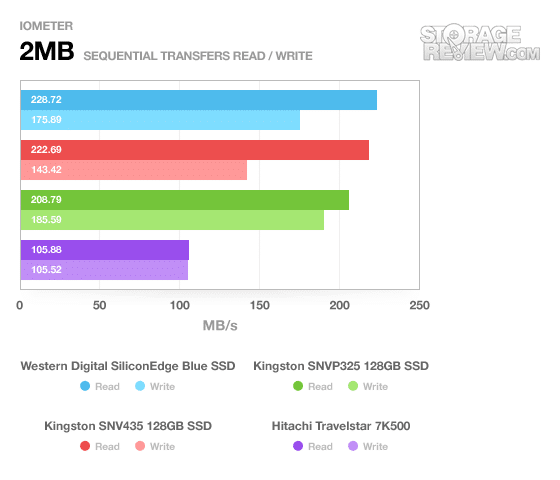
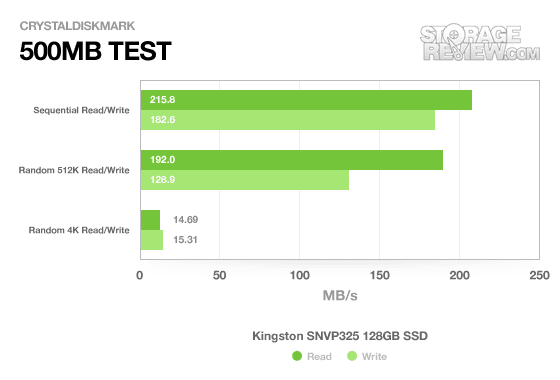
An area that flash storage really shines is random access since it has no moving parts. Unlike a HDD which has to reposition its heads on the platter to access different sections of the drive a SSD is only limited by how fast it can request data from a certain location inside a flash module. To show these differences we perform 2MB and 4K random transfers through IOMeter. The Kingston SSDNow V+ Series SSD actually fell behind its SSDNow V Series counterpart as well as the Western Digital SiliconEdge Blue SSDs.
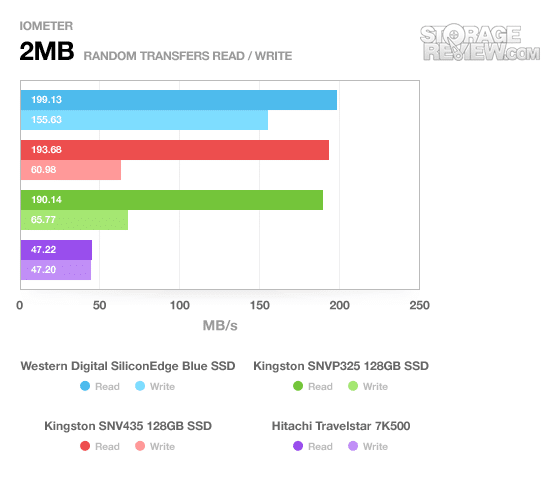
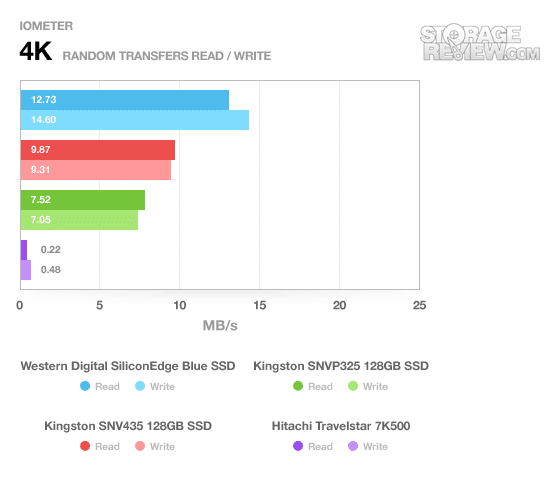
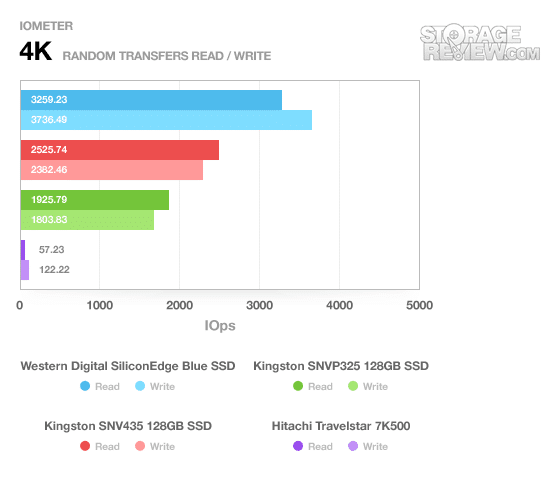
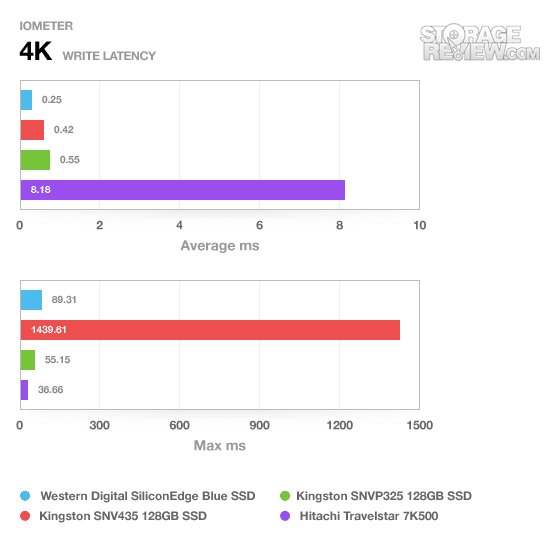
To test its performance under multi-user scenarios we use IOMeter with standard server profiles including Database, Workstation, Webserver, and File Server. We also want to note that this drive does not currently list itself as supporting Native Command Queuing (NCQ) inside the Intel Storage Matrix Console. In these tests the SSDNow V+ Series SSD didn’t perform overly well. As Kingston doesn’t specifically target this drive towards enterprise users, weak performance in this area might not be reflected in normal use.
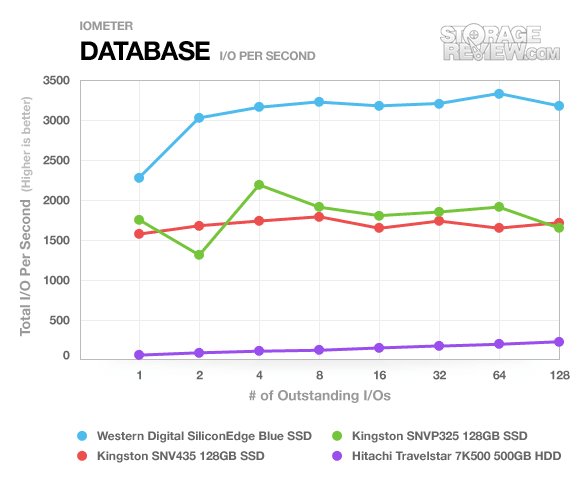
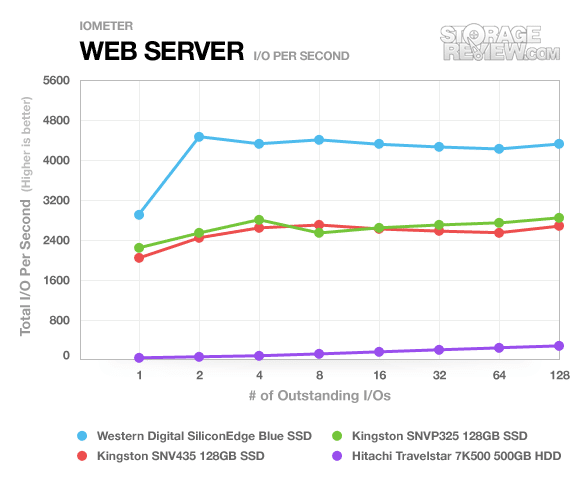
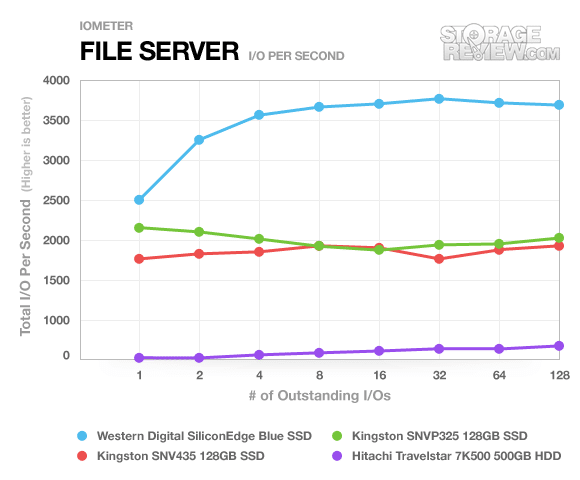
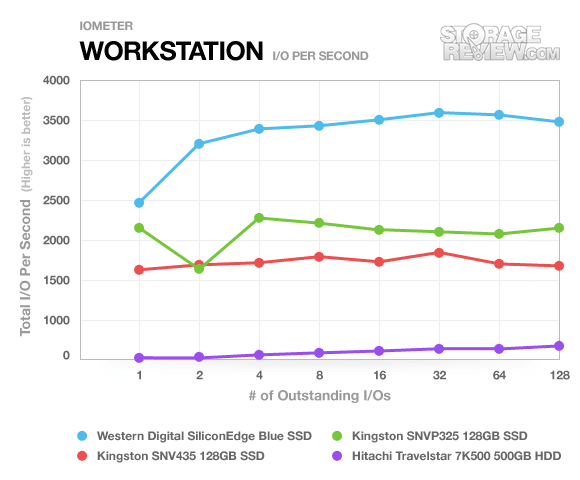
Going by synthetic benchmarks alone it would appear that the SSDNow V+ series actually performs slower than the SSDNow V Series in all but sustained sequential write speeds. That is until you look at its performance during real-life disk usage scenarios. Running our HTPC I/O trace on the Kingston SSDNow V+ Series we see it is almost twice as fast as the SSDNow V Series. It offers double the I/O and transfer speeds, and even has half the average latency. It is also important to note that in this particular situation the SSDNow V+ Series SSD is four times faster than the Hitachi 7K500 (which is the fastest HDD alternative in the 2.5″ form factor).
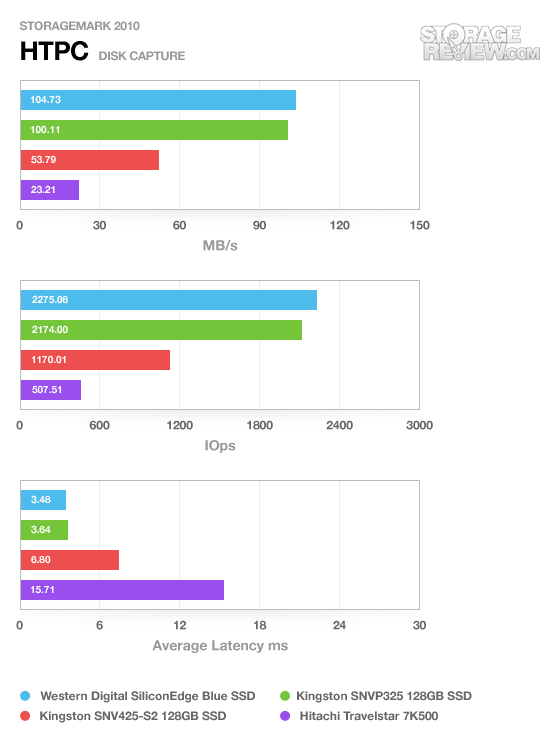
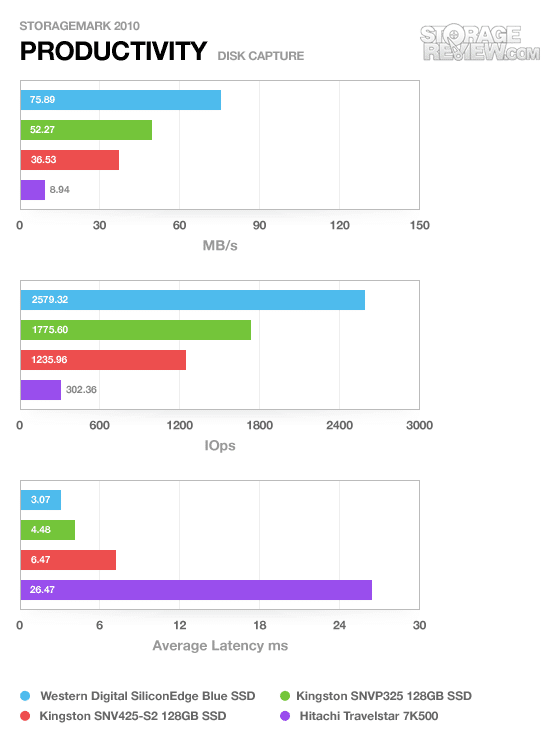
Power Consumption
We found the power consumption on the Kingston SSDNow V+ Series SSD to be terrific in nearly all situations. One area that really impressed us was its super low idle, measuring 0.21 watts! For notebooks where every watt matters when it comes to extended battery life this is a huge plus. Another area that was very interesting was how this drive handled TRIM or garbage collection. In our review of the Western Digital SiliconEdge Blue we noted how certain random activity could trigger a GC-session that would last upwards of 20 to 30 minutes. Using our power meters to watch the activity of the drive we saw that most GC-sessions on the V+ Series lasted around 15-20 seconds! This was tested multiple times using IOMeter to send random 4K transfers across the entire drive and each time GC activity halted 15-20 seconds later. This was so fast that initially we doubted our drive supported TRIM until double checked the spec sheet and looked closer at its power activity.
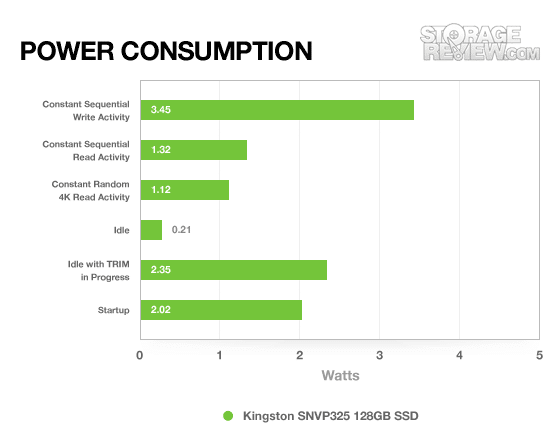
Warranty
Kingston offers a 3-year warranty on all current SSD models. This includes the V+, V, M, and E-series models. This length of matched by other manufacturers such as Western Digital and Intel. Kingston rates the lifespan of the SSDNow V+ Series SSD at 1,000,000 hours or just over 100 years. This doesn’t take into account write activity which has a finite life of roughly 10,000 cycles. For the average user most SSDs should outlast the computer they were installed in.
Conclusion
For the average user who wants to get a good bang for their buck the Kingston SSDNow V+ Series SSD offers solid mid-range performance for a reasonable price. Compared to the Hitachi Travelstar 7K500 – which is the fastest 2.5″ HDD on the market right now – the V+ Series SSD offers a substantial boost in performance and much lower power consumption. If you want a boost in speed over a HDD, support for TRIM, and a solid warranty the Kingston SNVP325-S2 SSD is reasonable choice. Also consider the $20 premium for the complete upgrade kit, which makes it as simple as can be to migrate from an old disk to a new SSD.
Pros
- Offered with an optional kit to assist with upgrading from an old hard disk drive (adds roughly $20 to purchase price)
- Rugged construction
- Low power consumption
Cons
- Runs middle of the pack in I/O speed
Bottom Line
The Kingston SSDNow V+ Series SSD offers mid-range performance for about $2.57 per GB based off the 128GB model and comes with an optional kit to facilitate an easy upgrade to an existing machine. We like the value Kingston offers with the SNVP325-S2 and think it makes sense for those who want to go the SSD route and don’t have the need for more expensive performance-oriented SSDs.




 Amazon
Amazon